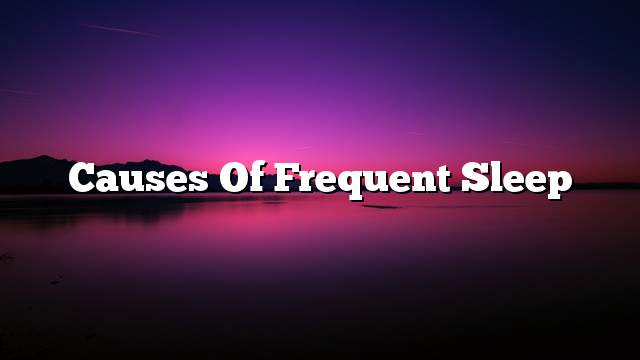Frequent sleep
Some people suffer from drowsiness all day long even if they take naps, and they sleep for long periods of up to 10-12 hours during the night, and may be accompanied by problems with memory and energy as well as anxiety.
Causes of frequent sleep
Causes of frequent sleep include:
The condition usually begins in childhood, and this problem causes the obstacles behind the possibility of a person to perform his functions and activities daily, usually occurs this situation in many waking at night, and although people may not remember that they have already awakened; Prevents them from getting a comfortable and sufficient sleep.
Symptoms of frequent sleep
Sleep is characterized by one or more of the following:
Complications of frequent sleep
It is not necessarily that the person has a sleep disorder to feel many complications; frequent sleep, whether caused by a disorder or other may cause the following:
Contrary to what is expected, those who sleep a lot are more prone to accidents. The reason for this is that drowsiness continues with them even when they are awake. Therefore, these people should be careful when driving or handling dangerous machinery.
Treatment of frequent sleep
Sleep is often treated with the cause of the cause, which makes the person sleep for a while. For example, if a person has a sleep apnea, it is usually treated with continuous positive airway pressure, This is done by wearing the pouch on the nose at sleep and connecting it to a machine that continuously airs the nostrils. The pressure of this air keeps the airway open and does not shut it from time to time so as not to break the breath during sleep.
Changing daily habits also helps keep them away from caffeine before sleep for several hours and keep away from alcohol. Some medications help to wake up, including stimulants and some antidepressants, and there are special medications that make a person alert, including modafinil. , And in a study of this drug, it was found to enhance the performance and attention of patients suffering from excessive sleep and self-applaudation, but in the case that the drugs taken by the person is the reason for the large number of sleep, then he should see the doctor to either change the dose or change medication.
Recommended sleep hours for each age
Depending on how much sleep a person needs, he or she may vary slightly between people at the same age. Other factors affect sleep quality and pregnancy. In general, the recommended sleep hours for each child are as follows:
- Neonatology: (14-17) hours with cyanolate.
- Infants: (12-15) hours with cyanoles.
- Young children: (11-14) hours with cyanoles.
- Pre-school children: (10-13) hours.
- School-age children: (9-11) hours.
- Adolescents: (8-10) hours.
- Adults: (7-9) hours.
- Older people: (7-8) hours.
Tips for a mild sleep
For moderate sleep, the following tips are recommended:
